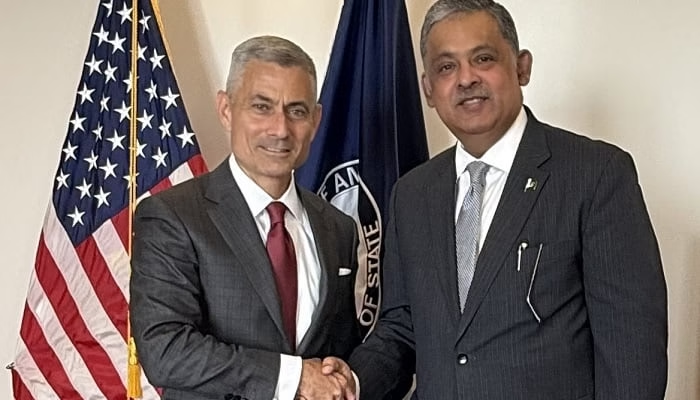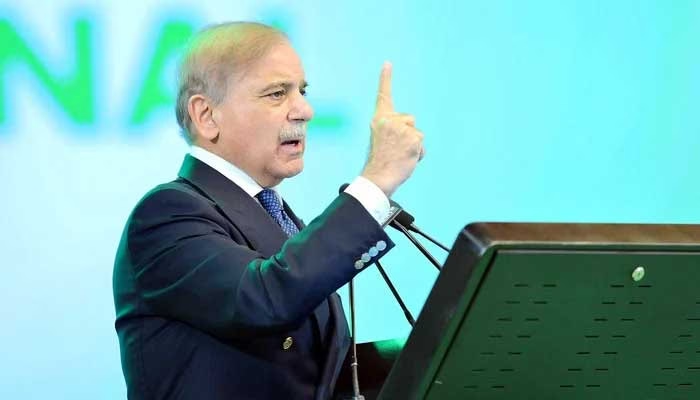The recent Ambassador Sheikh Paul Kapur meeting in Washington has set the tone for what both sides hope will be a more structured and economically grounded chapter in Pakistan–US relations. Pakistan’s Ambassador to the United States, Rizwan Saeed Sheikh, met with newly appointed US Assistant Secretary of State for South and Central Asian Affairs Paul Kapur, congratulating him on assuming office and using the opportunity to reinforce Islamabad’s desire for deeper strategic cooperation rooted in economic engagement.
Held at the US State Department, the meeting was described by diplomatic officials as an important early step in turning the leadership-level goodwill of recent months into a more concrete policy direction. Ambassador Sheikh emphasised that the era of symbolic gestures must now evolve into sustained working-level collaboration, particularly in trade, investment, energy, and other sectors that can anchor the relationship in long-term stability. The Ambassador Sheikh Paul Kapur interaction, therefore, was less about ceremony and more about charting a path toward practical cooperation.
In a statement shared on his official social media account, Ambassador Sheikh highlighted that the conversation centred on translating the broad commitment made by leaders of both countries into a genuine, economically driven partnership. He stressed the need for sustained engagement in multiple domains of mutual interest,underscoring that Pakistan is eager to shift the bilateral relationship away from crisis-driven diplomacy and towards steady, predictable collaboration. For Islamabad, the priority is clear: meaningful economic cooperation must become the backbone of future relations.
Pleased to meet Assistant Secretary Paul Kapur.
— Amb. Rizwan Saeed Sheikh (@AmbRizSaeed) November 8, 2025
Congratulated him on assumption of duties as A/S @State_SCA.
Discussed ways and means of translating the resolve – expressed at the leadership level – of developing Pak-US ties into an economically entrenched strategic… pic.twitter.com/0UtAerTklf
Assistant Secretary Kapur responded with equal optimism. In his own statement, he expressed his willingness to explore ways to strengthen the bilateral relationship and work toward a more prosperous and secure future for both nations. The Ambassador Sheikh Paul Kapur meeting thus highlighted shared interest, even if a detailed roadmap is yet to emerge. For now, the tone remains constructive — a promising sign for Pakistan, which has been seeking to rebuild diplomatic channels and diversify ties during a period of economic hardship and shifting regional dynamics.
Paul Kapur’s appointment is seen as particularly significant for South Asian diplomacy. Sworn in on October 22, 2025, he brings to the role a strong academic and strategic background. Kapur is on leave from the United States Naval Postgraduate School, where he served as a professor in the Department of National Security Affairs. His scholarly work has long focused on nuclear stability and regional security in South Asia, making him well-versed in the strategic complexities of Pakistan’s neighbourhood.
Kapur’s distinguished career includes serving on the State Department’s Policy Planning Staff, being a visiting fellow at the Hoover Institution, and teaching at Claremont McKenna College. He is the author and co-author of several authoritative books on nuclear strategy and South Asian security, including Dangerous Deterrent and India, Pakistan, and the Bomb. His writing has appeared in leading academic journals and influential news outlets, adding depth to his understanding of geopolitical issues. The Ambassador Sheikh Paul Kapur dialogue is therefore viewed as a valuable meeting between two individuals with strong backgrounds in diplomacy and regional affairs.
Beyond the professional profiles, this meeting carries broader strategic importance. Pakistan is seeking not only diplomatic reassurance but also a path to greater economic engagement at a time when global competition, regional tensions, and internal economic challenges require diversified partnerships. The United States, too, is evaluating its role in South and Central Asia amid shifting global priorities, and this meeting signals that Washington remains open to collaboration.
While US officials have not yet outlined a concrete plan for future engagement, their willingness to maintain momentum is seen as encouraging in Islamabad. The meeting helps keep the bilateral relationship from drifting, especially after years marked by security concerns, political turbulence, and shifting alliances. The Ambassador Sheikh Paul Kapur conversation offers a productive foundation on which further dialogue can be built.
For both countries, the next steps will be crucial. Pakistan hopes to secure deeper economic ties that can support its development goals, while the United States continues to balance its strategic interests across South and Central Asia. If the cooperative spirit shown in this meeting can be sustained, the coming months may bring a more coordinated, mutually beneficial phase in Pakistan–US relations.



